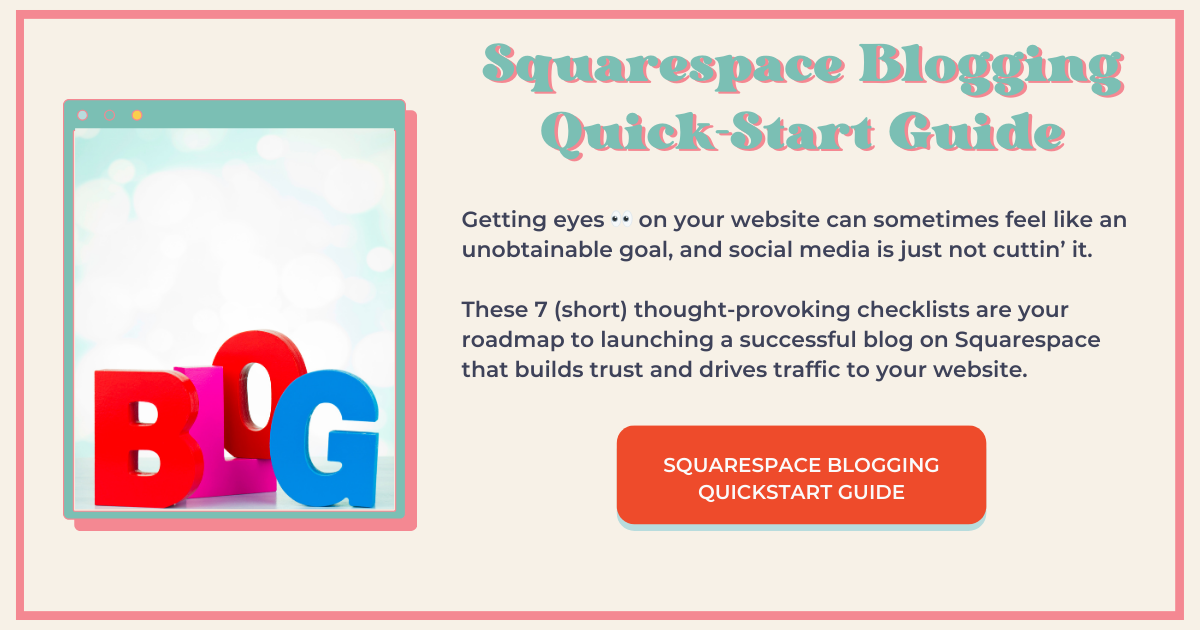Why Blogging is More Trustworthy than Social Media for Building Your Brand
Blogging is More Trustworthy than Social Media
If you’re a business owner, you HAVE to market your business (ugh)! Most business owners believe this means posting to social media every…single…day (double ugh). And many don’t even consider blogging as an alternative, or even an adjunct, to social media. For many, it’s not even on their radar.
But here’s the deal: blogging is more trustworthy than social media when it comes to building a credible, lasting brand.
Unlike social media, where content is often fleeting and focused on “the moment,” blogging offers a way to create lasting, valuable resources that resonate with your audience’s real needs and pain points. Not to mention, your blog post won’t disappear in 48 hours leaving you in a position to constantly feed the content beast of social media.
In this post, I’m gonna compare and contrast blogging and social media to demonstrate how blogging is a powerful tool for establishing trust and authority with your target audience, helping you connect with them in ways that social media simply can’t match.
Blogs Provide Real Solutions to Your Audience’s Pain Points
One of the biggest reasons blogging stands out as a trustworthy platform is its ability to focus on solving your audience's problems. People visit blogs because they're looking for answers or resources that will help them achieve a specific goal or overcome a challenge. Unlike social media posts, which are often skimmed quickly, blog posts give you space to dive deep and provide practical solutions.
When you publish blog content that addresses your readers' pain points, you're not just posting for the sake of engagement; you’re offering real value by directly addressing the needs of your target audience. This builds trust, as your readers see you as a helpful, reliable source of information.
How This Builds Trust:
Establishes Authority: When readers find solutions to their problems on your blog, they start seeing you as an expert in your field.
Demonstrates Empathy: By understanding and addressing their pain points, you show that you genuinely care about helping them, not just selling to them.
Blogging Allows for Evergreen Content That Stays Relevant
On social media, content has a short lifespan. A post might get traction for a day or two if you’re lucky, but soon it’s buried in the endless scroll.
Blogging, on the other hand, lets you create evergreen content—articles that remain relevant and valuable long after they’re published.
When people can find answers on your blog weeks, months, or even years after the post goes live, it reinforces your credibility as a consistent, reliable resource.
Readers know they can come back to your blog to find relevant information anytime, making your site a trusted reference point in their journey.
Benefits of Evergreen Content:
Long-Lasting Value: Your blog posts continue to drive traffic and provide value long after you’ve published them, unlike social media posts that quickly fade.
Trust Through Consistency: When people see that you’ve been publishing valuable content over time, it establishes your reputation as a dependable expert.
Blogging is Essential for SEO and Increases Organic Website Traffic
One of the biggest advantages of blogging over social media is its impact on your SEO (Search Engine Optimization).
While social media can give you bursts of visibility, blogs help you build long-term, organic traffic by targeting relevant keywords that your audience is searching for.
Every blog post is a new opportunity to rank on search engines, making it easier for potential customers to find you. When people discover your blog through a Google search, they’re more likely to see you as a credible authority.
They didn’t stumble upon you through a fleeting post in their feed—they found you because you provided an answer to something they were actively searching for.
Why SEO Builds Trust:
Credibility: High-ranking content gives the impression that you’re a trusted, authoritative source.
Organic Discovery: When people find you through search engines, it feels less like a targeted ad and more like discovering a genuine resource, which builds immediate trust.
Blogs Create a Sense of Permanence and Professionalism
Social media is often seen as a “casual” space. While this can be beneficial for engaging with followers or brand visibility, it doesn’t always convey professionalism.
A well-maintained blog, however, gives your business a sense of permanence and authority. It shows that you’re serious about providing valuable information and that you’ve invested in creating a resource for your audience.
A blog on your website is a space you fully control. You’re not at the mercy of social media algorithms or unexpected platform changes that are never designed to benefit YOU.
When people visit your blog, they’re engaging with your brand on your terms, which helps establish a more trustworthy and controllable connection.
How This Builds Trust:
Professional Image: A blog represents a more polished, serious approach to content, which enhances your brand’s credibility.
Reliability: With content housed on your own website, readers know where to find you and can depend on the stability of your resources.
Blogging Allows for Authentic, Unfiltered Communication
On social media, content often feels polished and curated to fit platform trends, resulting in posts that can seem “over-produced” or even inauthentic.
Blogs, on the other hand, offer a space for a more genuine, thoughtful approach to content. With a blog, you can dive deeper into your brand's mission, values, and unique perspective, without feeling pressured to follow the latest social media trend or gimmick.
When people visit your blog, they’re looking for real insights—not just a quick photo or meme. This expectation sets a blog apart as a more authentic platform, allowing you to share your voice and expertise in a way that feels true to your brand.
By writing thoughtfully crafted posts that resonate with your audience’s values and interests, you can build a more meaningful connection with your readers.
Why Authenticity Builds Trust:
Transparency: Blogging gives you space to discuss topics more thoroughly, which helps build credibility and transparency. Readers can see that you're willing to invest time in sharing knowledge, not just quick bites of information.
Consistent Voice: Unlike social media where content is often varied to keep up with trends, your blog allows for a consistent, authentic voice that strengthens your brand identity and fosters trust.
Final Thoughts
Blogging may not have the immediate, high-energy appeal of social media, but it’s a far more trustworthy platform when it comes to building a credible, lasting brand.
By focusing on solving your audience’s pain points, creating evergreen content, boosting SEO, and maintaining authenticity, a blog can position you as an authority in your field in ways social media simply can’t.
For business owners, especially those using platforms like Squarespace, investing in a blog is about more than just traffic—it’s about creating a stable, reliable resource that stands the test of time.
So, if you’re serious about growing your business and building trust with your audience, don’t overlook the power of a well-crafted blog.
Share your own thoughts in the comments 👇
This page contains affiliate links
Like this post?











